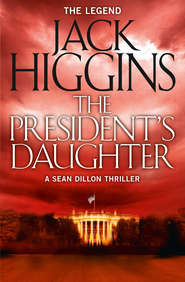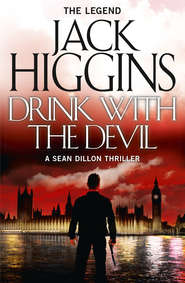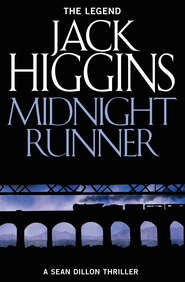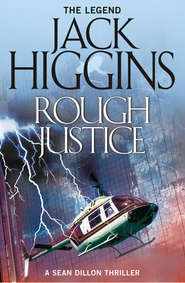По всем вопросам обращайтесь на: info@litportal.ru
(©) 2003-2024.
✖
A Fine Night for Dying
Автор
Год написания книги
2019
Настройки чтения
Размер шрифта
Высота строк
Поля
A Fine Night for Dying
Jack Higgins
The death of a gangster draws super-spy Paul Chavasse into a breathtaking adventure on the high seas – an unforgettable tale from one of the true masters of modern thriller writing, the bestselling author of Midnight Runner and The Keys of Hell.Caught in the nets of a local fishing boat, the body of gangland boss Harvey Preston is dragged from the English Channel, wrapped from head to toe in heavy chain. British intelligence suspects a connection with a cross-channel smuggling ring. But as undercover agent Paul Chavasse embarks on what will be one of the most dangerous cases in his extraordinary career, he soon discovers that this is no small-time operation – and the ruthless men behind it will stop at nothing to protect their precious cargo.
JACK HIGGINS
A FINE NIGHT FOR DYING
Contents
Cover (#ud00e2a91-a7b0-5ca8-93ba-6fb9f591b701)
Title Page (#u22d2ee83-b5ed-56c0-818d-602425542e0c)
ENGLISH CHANNEL1969 (#u047b943b-956b-573a-aa46-6d18d1443dbf)
1
2
NAPLES - MARSEILLE
3
FRANCE
4
BRITTANY
5
ENGLISH CHANNEL
6
7
8
LONDON
9
10
BRITTANY
11
FRANCE THE CAMARGUE
12
HELLGATE
13
14
15
About the Author
Also by Jack Higgins
Publisher’s Note
Copyright
About the Publisher
ENGLISH CHANNEL 1969 (#u536697fe-7ffc-599c-bd7f-4f793128aa54)
1 (#u536697fe-7ffc-599c-bd7f-4f793128aa54)
There were times when Jean Mercier wondered what life was all about and this was very definitely one of them. Somewhere beyond the boat in the darkness was a shoreline that he could not see, hazards at which he could only guess, and the lack of navigation lights wasn’t helping.
A wind that came all the way from the Urals spilled out across the Golfe de St-Malo, driving the waves into whitecaps, scattering spray against the windscreen of the launch. Mercier throttled back the engine and adjusted his steering slightly, straining his eyes into the darkness, waiting for a light like some sign from heaven.
He rolled a cigarette awkwardly with one hand, aware of a trembling in the fingers that would not be stilled. He was cold and tired and very scared, but the money was good, cash on the barrel and tax-free-more than he could earn from three months of fishing. With an ailing wife on his hands, a man had to take what came and be thankful.
A light flashed three times, and then was gone so quickly that for a moment he wondered whether he had imagined it. He ran a hand wearily across his eyes and it flickered again. He watched through a third repetition, mesmerized, then pulled himself together and stamped on the floor of the wheelhouse. There were steps on the companionway, and Jacaud appeared.
He had been drinking again and the smell, sourly sharp on the clean salt air, made Mercier feel slightly sick. Jacaud shoved him to one side and took the wheel.
‘Where is it?’ he growled.
The light answered him, ahead and slightly to port. He nodded, pushed up speed and turned the wheel. As the launch rushed into the darkness, he took a half-bottle of rum from his pocket, swallowed what was left and tossed the empty bottle through the open door. In the light from the binnacle, he seemed disembodied, a head that floated in the darkness, a macabre joke. It was the face of an animal, a brute that walked on two legs with small pig-eyes, flattened nose and features coarsened by years of drink and disease.
Mercier shuddered involuntarily, as he had done many times before, and Jacaud grinned. ‘Frightened, aren’t you, little man?’ Mercier didn’t reply and Jacaud grabbed him by the hair, one hand still on the wheel, and pulled him close. Mercier cried out in pain and Jacaud laughed again. ‘Stay frightened, that’s how I like it. Now go and get the dinghy ready.’
With a heave, he sent him out through the open door and Mercier grabbed at the rail to save himself. There were tears of rage and frustration in his eyes as he felt his way along the deck in the darkness and dropped to one knee beside the rubber dinghy. He took a spring knife from one pocket, feeling for the line that lashed the dinghy into place. He sawed through it, then touched the razor edge of the blade of his thumb, thinking of Jacaud. One good thrust was all it would take, but even at the thought his bowels contracted in a spasm of fear, and he hastily closed the knife, got to his feet and waited at the rail.
The launch rushed into the darkness and the light flashed again. As Jacaud cut the engine, they slowed and started to drift broadside-on to the beach marked by the phosphorescence of the surf a hundred yards away. Mercier threw the anchor over as Jacaud joined him. The big man heaved the dinghy into the water on his own and pulled it in by handline.
‘Off with you,’ he said impatiently. ‘I want to get out of here.’
Water slopped in the bottom of the dinghy, cold and uncomfortable, as Mercier mounted the two wooden oars and pulled away. He was afraid again, as he always was these days, for the beach was unknown territory in spite of the fact that he had visited it in identical circumstances at least half-a-dozen times before. But there was always the feeling that, this time, things might be different-that the police could be waiting. That he might be drifting into a five-year jail sentence.
Jack Higgins
The death of a gangster draws super-spy Paul Chavasse into a breathtaking adventure on the high seas – an unforgettable tale from one of the true masters of modern thriller writing, the bestselling author of Midnight Runner and The Keys of Hell.Caught in the nets of a local fishing boat, the body of gangland boss Harvey Preston is dragged from the English Channel, wrapped from head to toe in heavy chain. British intelligence suspects a connection with a cross-channel smuggling ring. But as undercover agent Paul Chavasse embarks on what will be one of the most dangerous cases in his extraordinary career, he soon discovers that this is no small-time operation – and the ruthless men behind it will stop at nothing to protect their precious cargo.
JACK HIGGINS
A FINE NIGHT FOR DYING
Contents
Cover (#ud00e2a91-a7b0-5ca8-93ba-6fb9f591b701)
Title Page (#u22d2ee83-b5ed-56c0-818d-602425542e0c)
ENGLISH CHANNEL1969 (#u047b943b-956b-573a-aa46-6d18d1443dbf)
1
2
NAPLES - MARSEILLE
3
FRANCE
4
BRITTANY
5
ENGLISH CHANNEL
6
7
8
LONDON
9
10
BRITTANY
11
FRANCE THE CAMARGUE
12
HELLGATE
13
14
15
About the Author
Also by Jack Higgins
Publisher’s Note
Copyright
About the Publisher
ENGLISH CHANNEL 1969 (#u536697fe-7ffc-599c-bd7f-4f793128aa54)
1 (#u536697fe-7ffc-599c-bd7f-4f793128aa54)
There were times when Jean Mercier wondered what life was all about and this was very definitely one of them. Somewhere beyond the boat in the darkness was a shoreline that he could not see, hazards at which he could only guess, and the lack of navigation lights wasn’t helping.
A wind that came all the way from the Urals spilled out across the Golfe de St-Malo, driving the waves into whitecaps, scattering spray against the windscreen of the launch. Mercier throttled back the engine and adjusted his steering slightly, straining his eyes into the darkness, waiting for a light like some sign from heaven.
He rolled a cigarette awkwardly with one hand, aware of a trembling in the fingers that would not be stilled. He was cold and tired and very scared, but the money was good, cash on the barrel and tax-free-more than he could earn from three months of fishing. With an ailing wife on his hands, a man had to take what came and be thankful.
A light flashed three times, and then was gone so quickly that for a moment he wondered whether he had imagined it. He ran a hand wearily across his eyes and it flickered again. He watched through a third repetition, mesmerized, then pulled himself together and stamped on the floor of the wheelhouse. There were steps on the companionway, and Jacaud appeared.
He had been drinking again and the smell, sourly sharp on the clean salt air, made Mercier feel slightly sick. Jacaud shoved him to one side and took the wheel.
‘Where is it?’ he growled.
The light answered him, ahead and slightly to port. He nodded, pushed up speed and turned the wheel. As the launch rushed into the darkness, he took a half-bottle of rum from his pocket, swallowed what was left and tossed the empty bottle through the open door. In the light from the binnacle, he seemed disembodied, a head that floated in the darkness, a macabre joke. It was the face of an animal, a brute that walked on two legs with small pig-eyes, flattened nose and features coarsened by years of drink and disease.
Mercier shuddered involuntarily, as he had done many times before, and Jacaud grinned. ‘Frightened, aren’t you, little man?’ Mercier didn’t reply and Jacaud grabbed him by the hair, one hand still on the wheel, and pulled him close. Mercier cried out in pain and Jacaud laughed again. ‘Stay frightened, that’s how I like it. Now go and get the dinghy ready.’
With a heave, he sent him out through the open door and Mercier grabbed at the rail to save himself. There were tears of rage and frustration in his eyes as he felt his way along the deck in the darkness and dropped to one knee beside the rubber dinghy. He took a spring knife from one pocket, feeling for the line that lashed the dinghy into place. He sawed through it, then touched the razor edge of the blade of his thumb, thinking of Jacaud. One good thrust was all it would take, but even at the thought his bowels contracted in a spasm of fear, and he hastily closed the knife, got to his feet and waited at the rail.
The launch rushed into the darkness and the light flashed again. As Jacaud cut the engine, they slowed and started to drift broadside-on to the beach marked by the phosphorescence of the surf a hundred yards away. Mercier threw the anchor over as Jacaud joined him. The big man heaved the dinghy into the water on his own and pulled it in by handline.
‘Off with you,’ he said impatiently. ‘I want to get out of here.’
Water slopped in the bottom of the dinghy, cold and uncomfortable, as Mercier mounted the two wooden oars and pulled away. He was afraid again, as he always was these days, for the beach was unknown territory in spite of the fact that he had visited it in identical circumstances at least half-a-dozen times before. But there was always the feeling that, this time, things might be different-that the police could be waiting. That he might be drifting into a five-year jail sentence.











